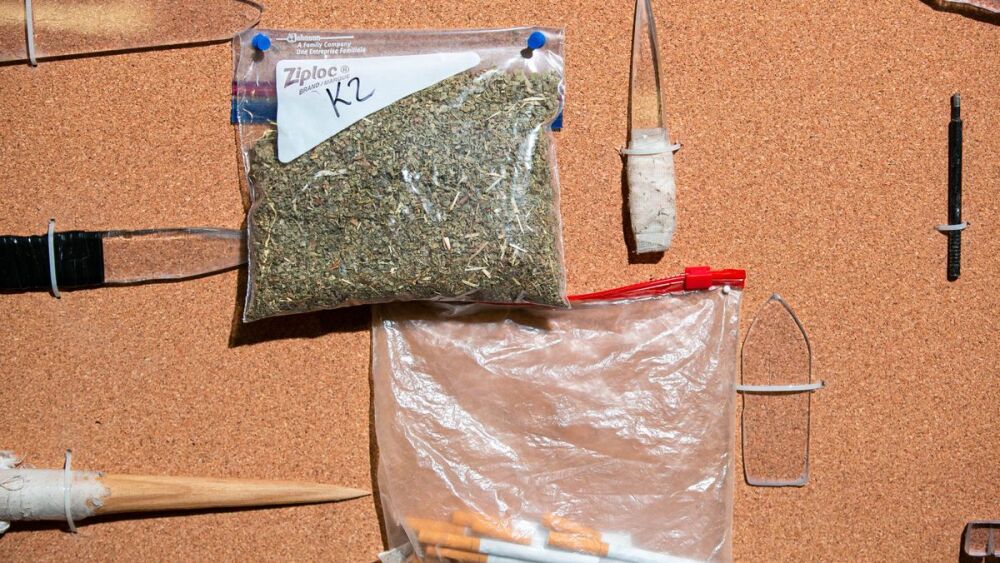By Graham Rayman
New York Daily News
NEW YORK — A plan to curb the flow of illegal drugs into Rikers Island by changing how detainees get packages and letters is being slammed by advocates as law enforcement overreach.
Correction officials propose barring detainees from receiving packages from anyone other than third party vendors like Amazon or other companies that ship directly to consumers.
The department also wants to set up a new system to get letters to detainees. Once letters arrive at Rikers, they’d be scanned into an electronic system and forwarded for detainees to read on tablet computers.
The idea is to keep illegal drugs from getting to the island. The Correction Department says drugs including fentanyl and K2 can be liquified and soaked into paper, including in books and letters.
Six detainees have died this year of drug overdoses, though it’s not clear if any of those incidents are linked to smuggled drug-soaked paper.
“What we must do is stop drugs before they get into our jails,” Correction Commissioner Louis Molina said at a City Council hearing last week. “We will be making substantial changes to our correspondence policy.”
Earlier this year, state prison officials adopted a policy on shipping packages to inmates similar to Molina’s proposal. In a statement to the Daily News, state corrections officials touted the program as yielding an 86% drop in the number of contraband items found in package rooms.
“Early data show that the package program has done what it set to do by preventing the introduction of drugs and dangerous contraband into New York’s prisons,” said Rachel Connors, a spokeswoman for the state Department of Corrections and Community Supervision.
Another sign of the policy’s effectiveness is a sharp decline in the use of Narcan, a drug that reverses the effects of drug overdoses, Connors said.
Between April and September, prison employees administered Narcan 225 times — a decline of 24% from the same period in 2021, when Narcan was administered 295 times, Connors said.
But Therese Grady, whose ailing 68-year-old husband is in prison, says the state’s package ban is problematic. Buying things like fresh produce or winter clothes is easier to do in person and less expensive, she said.
With the state corrections department’s new ban on care packages from home, “it’s a lot more expensive to use these vendors and they don’t carry everything we need,” she said. “For the elderly men and women who are dealing with illnesses beyond their control, they need healthy fruits and vegetables in abundance just to survive.”
Grady asserted the package policy is a diversion from the fact that prison staff is also involved in smuggling.
“DOCCS doesn’t want to admit that its own staff — its own officers — are the ones bringing in the contraband,” she said. “This supposed safety intervention is just punitive and an excuse to retaliate against incarcerated people. The city shouldn’t make the same mistake.”
The second part of Molina’s proposal would hire a private company to scan letters to detainees and then email them to their tablets.
State prisons do not have such a program, but in some prisons letters are photocopied before they’re given to inmates. Sometimes, the images are smudged or blurry, said Jared Chausow, an activist with prisoners’ rights groups.
For its part, the Legal Aid Society opposes Molina’s mail fixes, saying the city Correction Department is restricting the rights of detainees to mask staff complicity in contraband smuggling.
“The department’s plan to withhold mail delivery, and instead contract with a vendor to scan mail for delivery to tablets, is an expensive, cruel, intrusive response that burdens incarcerated persons with no demonstrable benefit except to profit the industry that markets these services,” the Society said.
The society noted that between April 2020 and May 2021, when visitors were barred during the pandemic, contraband drugs were seized in jail searches roughly 2,600 times — about double the number the same period of 2018 and 2019 before the pandemic.
Yet, Molina has declined to use body-scanning devices on DOC staff, saying the machines are too expensive and too difficult to erect at the jails.
DOC officials did not respond to a Daily News inquiry on the status of the proposals.
NEXT: Controlling contraband in jails and prisons: What COs need to know
©2022 New York Daily News.
Visit nydailynews.com.
Distributed by Tribune Content Agency, LLC.












